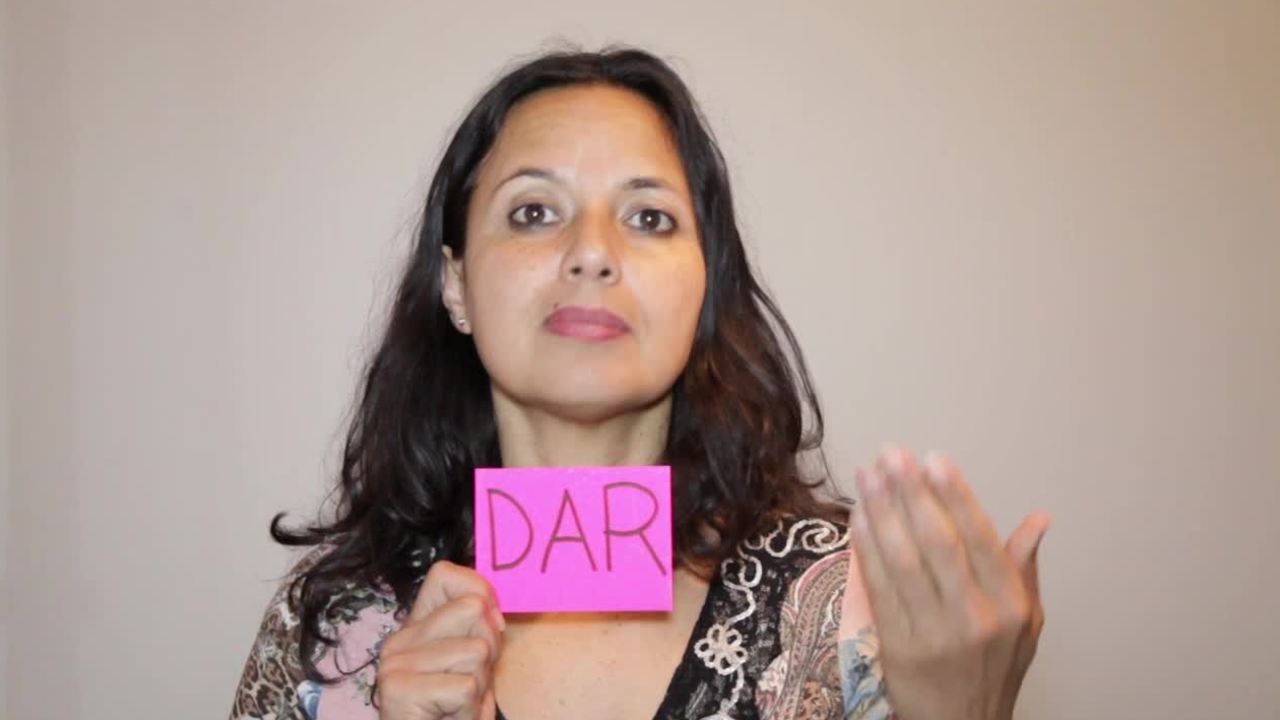
Spanish teacher Carolina Graterol has a knack not only for explaining the intricacies of Spanish grammar but also for pointing out those errors she notes most commonly among students. A favorite among Yabla subscribers of all levels, Carolina’s succinct speech makes learning even tough grammatical concepts both accessible and enjoyable.
Difficulty:
 Beginner
Beginner
Venezuela
Carolina teaches about the apocopation, or shortening, of a small group of masculine singular adjectives in Spanish.
Difficulty:
 Beginner
Beginner
Venezuela
Having noticed a lot of confusion among her students regarding the usage and meaning of reflexive verbs and pronouns, Venezuelan Spanish teacher, Carolina Graterol, clarifies these topics with some useful examples.
Difficulty:
 Beginner
Beginner
Venezuela
Carolina gives us an in depth explanation of the verb "dar" (to give) in various contexts and sentences.
Difficulty:
 Newbie
Newbie
Venezuela
Teacher Carolina shares this lesson to help us differentiate between three Spanish verbs that have a very similar meaning.
Difficulty:
 Beginner
Beginner
Venezuela
Carolina teaches us the difference between the Spanish verbs "saber" and "conocer" [to know], which are similar but not interchangeable and used in different contexts.
Difficulty:
 Beginner
Beginner
Venezuela
Carolina, a Venezuelan Spanish teacher, teaches us the difference between the Spanish verbs, "mirar" (to look at/watch), "ver" (to see) and "buscar" (to look for) and gives us examples of sentences in which they might be found.
Difficulty:
 Beginner
Beginner
Venezuela
Because the Spanish words/expressions "haber" and "a ver" and "si" and "sí" sound exactly the same, their very different meanings are often confused. Spanish teacher Carolina enlightens us as to their differences.
Difficulty:
 Beginner
Beginner
Venezuela
Carolina teaches us how to correctly express "tonight" (esta noche) and "last night" (anoche) in Spanish and cautions us against some commonly used but erroneous expressions for these concepts.
Difficulty:
 Beginner
Beginner
Venezuela
Carolina teaches us about a few copulative conjunctions in Spanish and gives us examples.
Difficulty:
 Beginner
Beginner
Venezuela
Carolina teaches us about disjunctive and copulative conjunctions- ways to express "or" and "or else"- in Spanish.
Difficulty:
 Beginner
Beginner
Venezuela
Carolina explains some common errors she has noticed among her students in order to preclude us from making them ourselves.
Difficulty:
 Beginner
Beginner
Venezuela
Carolina shares with us more common mistakes made by students learning Spanish.
Difficulty:
 Beginner
Beginner
Venezuela
Carolina explains the particular contexts in which one should use either "personaje" or "carácter" as a translation for the English word, "character," the difference between the Spanish words "de" and "dé," and, some different ways of expressing the date in Spanish depending upon the situation.
Difficulty:
 Beginner
Beginner
Venezuela
Carolina explains when to use the Spanish verb "deber" vs. "deber de" as well as the difference between the oft confused "demás" and "de más."
Difficulty:
 Beginner
Beginner
Venezuela
Carolina explains cases in which Spanish students tend to confuse when to use the Spanish forms of "to be," "ser" y "estar," as well as the difference between the prepositions "a" and "de" with respect to verbs of movement.
Difficulty:
 Beginner
Beginner
Venezuela
Although the majority of masculine nouns in Spanish end in "o" while the feminine ones end in "a," Carolina explains some exceptions to these rules, which tend to confuse Spanish students.
Difficulty:
 Beginner
Beginner
Venezuela
Carolina points out some common pluralization errors among Spanish students as well as a case in which many of them attempt to translate literally from English.
Difficulty:
 Beginner
Beginner
Venezuela
A participle is a personal form of a verb in which the verb becomes an adjective without totally losing its verb characteristics or nature. Carolina explains more about them.
Difficulty:
 Beginner
Beginner
Venezuela
In contrast with regular participles, irregular participles are those whose endings don't follow a specific pattern. Carolina explains more.
Difficulty:
 Beginner
Beginner
Venezuela
Carolina concludes her lessons on participles by discussing double participles, which are those that have two different accepted conjugations.
Difficulty:
 Beginner
Beginner
Venezuela
Carolina explains some common mistakes her students make when forming certain verb participles.
Difficulty:
 Beginner
Beginner
Venezuela
Carolina explains to us about the gerund, the form of a verb which expresses an action in progress.
Difficulty:
 Beginner
Beginner
Venezuela
Carolina explains about the gerund verb form in Spanish and some mistakes that native English speakers commonly make when employing it.
Difficulty:
 Intermediate
Intermediate
Venezuela
Carolina gives us an introduction to the passive voice in Spanish.
Difficulty:
 Intermediate
Intermediate
Venezuela
Carolina teaches us how to transform sentences from the active to the passive voice in Spanish with several accessible examples.
Difficulty:
 Intermediate
Intermediate
Venezuela
Carolina explains in greater detail how the passive voice is expressed in different verb tenses.
Difficulty:
 Intermediate
Intermediate
Venezuela
Carolina explains how the press and social media often use an abbreviated form of the passive voice to save space as well as how the pronoun "se" can be used to formulate sentences in the passive voice that emphasize what is sold or offered as opposed to the person selling or offering the service or merchandise.
Are you sure you want to delete this comment? You will not be able to recover it.